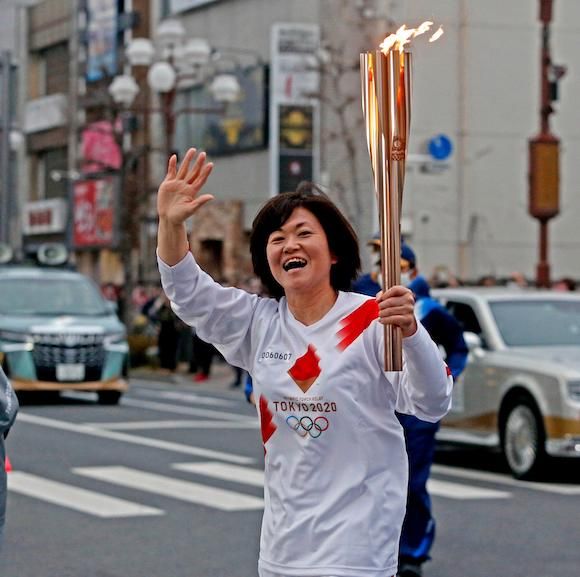The Olympic torch set off on 25th March from Fukushima for its 121-day journey through Japan’s 47 prefectures, and will be carried by 10,000 runners before it reaches its Tokyo destination. But there’s so much disaffection around these games that when it passed through one neighbourhood in Nara, a resident reported, nobody watched. Indeed, as the weeks tick down to the intended opening on 23rd July, no one is sure whether they will proceed.
Almost every day brings new pressure on the government and the International Olympic Committee (IOC) to call the games off. On 26th May, the left-leaning Asahi Shimbun became the first major Japanese newspaper to call on prime minister Yoshihide Suga to cancel. IOC vice-president Richard Pound dismissed this as “political posturing.” He has said that the deadline for a final decision is not until “the end of June,” but that is barely three weeks before an event that has been a decade in the making, and whose cost is estimated as between $15bn and $26bn.
Tokyo made its bid for what was meant to be the 2020 games in the shadow of the Fukushima nuclear catastrophe, and it was divisive from the off. When the bid triumphed in 2013, the games were touted as the post-Fukushima “Recovery Olympics,” but activists were soon pointing out that apparently limitless money has gone into the games while the Fukushima survivors were almost totally forgotten.
The most pressing issue now is, of course, Covid-19. Compared to other developed nations Japan has fared well in the pandemic—so far. The rates of illness and hospital admissions have been low: 13,000 deaths at the time of writing, a tenth of the 128,000 in the UK, despite Japan having a population twice as large. This is a country where everything is kept spotless, people habitually wear masks so as not to spread germs, bow rather than shake hands or hug and don’t consider restrictions an infringement on their civil liberties. But there is another reason for the relative success: Japan’s borders have essentially been sealed for over a year.
If the Olympics go ahead, there will suddenly be 15,000 athletes arriving as well as tens of thousands of officials, judges, journalists and volunteers. Should they bring infection with them, the effects could be catastrophic: vaccine rollout is painfully slow, with less than 3 per cent of the population fully jabbed. Early success notwithstanding, the country is already in the throes of a fourth wave of infections, with Tokyo and other major cities under a state of emergency as the death toll grows. In Osaka the hospitals are overwhelmed.

But like a juggernaut out of control, the games are so big and expensive they keep rolling on. One of the first to speak out was Beat Takeshi, a beloved comedian and actor famous in the west as the film director Takeshi Kitano, who said that the Olympics were “a waste of taxpayers’ money.” Hiroshi Mikitani, founder of online retail giant Rakuten, called them a “suicide mission.” Technology billionaire Masayoshi Son tweeted that they might trigger a new wave of infections and lockdowns, dragging down Japan’s growth. “I am very much afraid of having the Olympics,” he said. Even a former yakuza (Japanese mafia) boss turned philanthropist spoke out, saying: “Most people with common sense here are against holding the Olympics in the middle of what amounts to a war. The only people gunning for it are those who have a vested interest in the games, or money at stake.”
A recent poll by the Asahi Shimbun showed 83 per cent wanted the Olympics postponed or cancelled. Masked marchers outside the new National Stadium carried banners declaring “Olympics Kill the Poor.” The 6,000-strong Tokyo Medical Practitioners’ Association wrote in an open letter to the prime minister: “We believe the correct choice is to cancel an event that has the possibility of increasing the number of infected people and deaths.” Tokyo’s Tachikawa Sogo Hospital installed huge posters in its windows: “Medical Treatment Is at Its Limit. Call Off the Olympic Games! Spare Us!”
The IOC’s response—that the games will go ahead irrespective of public opinion and even if there is a state of emergency in Tokyo—has sparked outrage. It has compounded the fury by saying people will have to make sacrifices. Are Japanese people to sacrifice themselves for the IOC’s bank balance? Suga too cares little for public opinion. This is an election year, but his Liberal Democratic Party is so entrenched that even a disastrous Olympics will not affect his prospects.
Even for sports fans, the ongoing spats and fear of a superspreader event have cast a pall over the games. Without the festival atmosphere and large crowds, they will lose a lot of their lustre. Even if they do go ahead, the odds seem high that they will not be a glorious extravaganza but a bit of a damp squib. Like a senkou hanabi, a sparkler, the Tokyo games may glitter—or just fizzle out.













